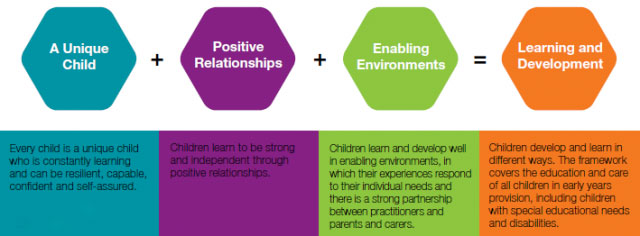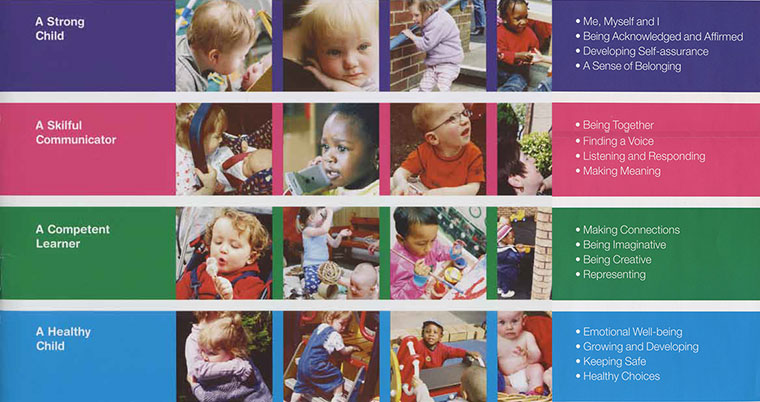Department of Education set the standards for learning, development and childcare for children from birth to five. The Early Years Foundation Stage (EYFS) is the framework that sets the standards that all nurseries must meet to ensure children learn and develop well and are kept healthy and safe.
Education both influences and reflects the values of our society, and the kind of society we want to be.
At Dees Day Nursery we recognise that the earliest years of a child's life provide a foundation for the future and therefore we strive to offer engaging and meaningful learning experiences to all of our children, starting at the age of 3 months.
Our aim is to ensure we meet every child's needs, in order to help them become confident, independent and resilient learners. We develop a close partnership with parents and this helps us provide the best opportunities for children to learn and become 'school ready'.
In our setting, practice is built on four main principles:

National Curriculum
Department of Education have recognised a set of common aims, values and purposes that underpin the curriculum and the work of schools. The school curriculum comprises all learning and other experiences that each school plans for its pupils. The National Curriculum is an important element of the school curriculum.
The National Curriculum has three aims. It should enable all young people to become:
- successful learners who enjoy learning, make progress and achieve
- confident individuals who are able to live safe, healthy and fulfilling lives
- responsible citizens who make a positive contribution to society.
Childcare Values
The curriculum reflects values in our society that promote personal development, equality of opportunity, economic wellbeing, a healthy and just democracy, and a sustainable future. These values relate to:
- ourselves, as individuals capable of spiritual, moral, social, intellectual and physical growth and development
- our relationships, as fundamental to the development and fulfilment of happy and healthy lives, and to the good of the community
- our society, which is shaped by the contributions of a diverse range of people, cultures and heritages
- our environment, as the basis of life and a source of wonder and inspiration that needs to be protected.
High Standards
The statutory curriculum establishes an entitlement for all children and promotes high standards. The purposes of having a statutory curriculum are:
- to establish an entitlement for all children, regardless of social background, culture, race, gender, differences in ability and disabilities, to develop and apply the knowledge, skills and understanding that will help them become successful learners, confident individuals and responsible citizens
- to establish national standards for children’s performance that can be shared with children, parents, teachers, governors and the public
- to promote continuity and coherence, allowing children to move smoothly between schools and phases of education and providing a foundation for lifelong learning
- to promote public understanding, building confidence in the work of schools and in the quality of compulsory education.
In particular, the curriculum should:
- promote high standards, particularly in literacy, numeracy and ICT capability
- provide continued entitlement from early years to a coherent, broad and balanced curriculum
- instil in children a positive disposition to learning and a commitment to learn
- promote and pass on essential knowledge, skills and understanding valued by society to the next generation
- be relevant to children and prepare them for the here and now, for the next phase of their education, and for their future
- widen horizons and raise aspirations about the world of work and further and higher education
- make children more aware of, and engaged with, their local, national and international communities
- help children recognise that personal development is essential to wellbeing and success.
Early Years Foundation Stage (EYFS)
The Early Years Foundation Stage (EYFS) is the statutory framework that sets the standards that all Early Years providers must meet to ensure that children learn and develop well and are kept healthy and safe. It promotes teaching and learning to ensure children are ready for school and gives children the broad range of knowledge and skills that provide the right foundation for good future progress through school and life.
We adhere to the standards set by the Early Years Foundation Stage (EYFS) to ensure that children learn and develop well and are kept healthy and safe. It promotes teaching and learning to ensure children’s ‘school readiness’ and gives children the broad range of knowledge and skills that provide the right foundation for good future progress through school and life.
Read more about Early Years Foundation Stage
Relevant diagrams and content are re-used under the terms of the Open Government Licence.
To view this licence, visit http://www.nationalarchives.gov.uk/doc/open-governmentlicence


